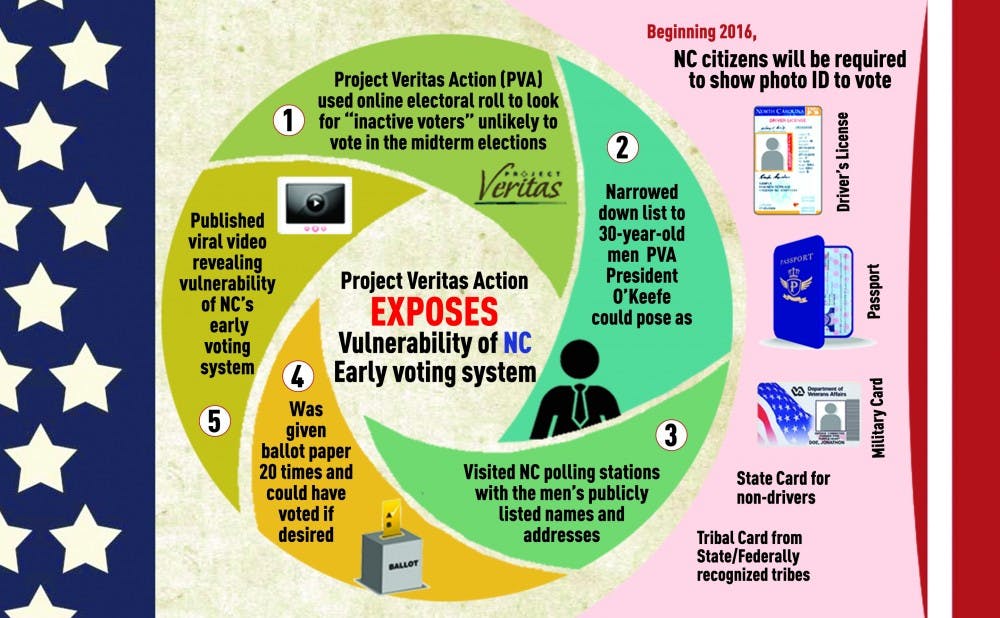With North Carolina's new voter identification law poised to take effect in 2016, one nonprofit organization used the midterm elections to show that committing voter fraud is currently easier than some might think.
In a viral video, national nonprofit Project Veritas Action highlighted the vulnerability of North Carolina's early voting system. James O'Keefe—president of the organization—posed as 20 different inactive voters, and received ballots at 20 different early voting sites across the state. With stricter voter identification requirements set to be enacted for the 2016 elections, the project exposed the flaws of the North Carolina voting system in a groundbreaking way, said John Aldrich, Pfizer-Pratt University professor of political science.
"[The video] was great, because they showed exactly the ways that large interest groups can take advantage of the trust system of polls," Aldrich said.
Although O'Keefe did not actually vote in the experiment, he was given a paper ballot 20 times and could have voted if desired, the video shows. By memorizing the publicly listed names and addresses of the inactive voters, he was able to pose as them without much trouble. O'Keefe—who founded Project Veritas Action with the aim of exposing fraud in politics—noted that his projects have had real-life implications in the past, and the North Carolina one might have similar consequences.
"My last video [about campaign fraud] led to the firing of Greg Amick, a Democratic campaign manager in the midterm elections," O'Keefe said. "The impacts are usually pretty significant."

North Carolina was one of 19 U.S. states where no identification was required to vote in the midterm elections that concluded last Tuesday. Voter registration laws vary widely from state to state—some only require ID for first-time voters, and others only require non-photo ID that lists name and address, such as a utility bill or paycheck.
As a result of these varied laws, some states experience the same fraud problems as North Carolina, O'Keefe said.
"We've also done videos in New Hampshire that expose much of the same thing as in North Carolina," he noted. "It just shows that fraud is a national problem strongly concentrated in more than a few states."
Although this type of fraud is possible, it is not necessarily likely. Aldrich emphasized that the fraud shown in the video was not something an everyday citizen would take the time to plan out.
"From my point of view, it is possible to commit fraud, but you will have to intentionally do it," he said. "It takes some effort to do it, so that means it's not just that people say on Election Day, 'Oh, let's commit fraud.' It's large groups and organizations that are behind it."
Aldrich said that, because many early voting election boards are Republican-dominated, the voting officials featured in the videos were most likely Republicans.
"Fraud is almost always an organized effort by a political party," Aldrich said. "If there's an organization, there’s always a person who will come up with an idea, like fake IDs, to sway the vote."
Beginning in the 2016 elections, North Carolina's voter ID laws will change to require a photo ID—such as a North Carolina drivers' license, a United States passport, a military ID card or a tribal ID card—at all polling sites. The new law has been controversial, with some arguing that it will disenfranchise minority voters and others positing that voter fraud does not occur on a large enough scale to merit tougher laws.
These laws will strengthen security at ballots, but they will not be foolproof, Aldrich warned.
"Some of these interest groups have great motivation to commit fraud," Aldrich said. "It's unfortunate, but even as the laws change, the nature of political groups won't."
Get The Chronicle straight to your inbox
Signup for our weekly newsletter. Cancel at any time.

